Tryptophan is an amino acid that can be taken as a supplement to boost your mood and your emotional stability, as well as improve your cognitive performance.
Since tryptophan is the sole precursor to the essential neurotransmitter serotonin, proper regulation of tryptophan levels plays a critical role in maintaining a stable mood, avoiding depression, aggression, and impulsive behavior, and ensuring high-quality sleep.
Tryptophan might even be able to increase your working memory during challenging cognitive tasks. If this is your goal—or if you want to push past normal and actually augment your mental well-being and cognitive performance—we’ve ranked the ten highest-quality tryptophan supplements on the market.
Research
Rankings
1. Amazing Formulas L-Tryptophan
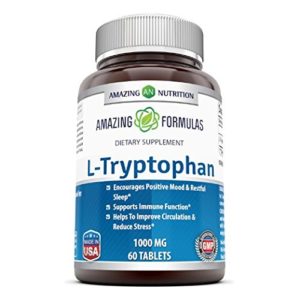
The tryptophan supplement from Amazing Formulas delivers a high dose of tryptophan in a minimal package.
The gelatin capsules contain 1000 mg of tryptophan, along with a bit of magnesium stearate for stability and nothing else. This makes for a strong and reliable source of tryptophan for anyone looking for cognitive enhancement.
2. NOW L-Tryptophan
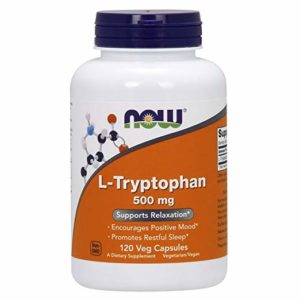
NOW Foods is known for simple and straightforward supplements, and that’s what they deliver with this tryptophan supplement.
Each capsule has 500 mg of tryptophan, with no additional ingredients aside from stearic acid. Vegetarians and vegans will like the cellulose-based capsule, and everyone can get on board with the moderate dosage and clean supplement design.
3. Superior Labs L-Tryptophan
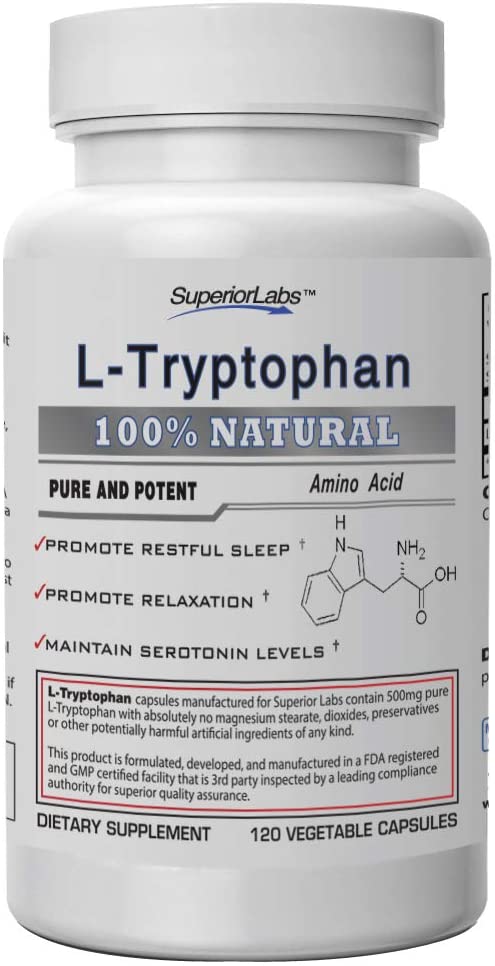
Superior Labs focuses on delivering a moderate dose of tryptophan with no additives and a high level of purity. The capsules are cellulose-based, have 500 mg of tryptophan each, and come in a fairly ample amount per bottle (120 caps, to be specific).
Though Superior Labs is a smaller brand, this supplement still has a wide base of support among tryptophan supplement users.
4. Pure Naturals L-Tryptophan Pure
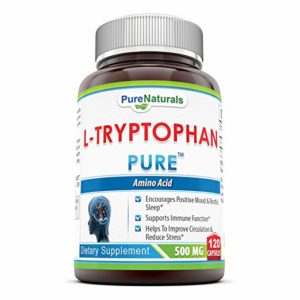
Pure Naturals has a moderate dose, high-quality, and American-made tryptophan supplement that’s a good fit for anyone who doesn’t need a high dosage.
The gelatin-based capsules deliver 500 mg of tryptophan, which is plenty for a lot of users. Without anything in the way of unnecessary ingredients, it’s a very solid pick.
5. Nutricost L-Tryptophan
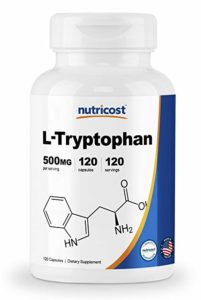
Nutricost has a tryptophan supplement that aims to boost absorption and bioavailability by using the proprietary black pepper extract BioPerine.
The supplement includes 5 mg of BioPerine, which may help boost the bioavaialbility of the 500 mg of tryptophan per capsule. The only downside is that the supplement design could be a little cleaner; there are ingredients like silicon dioxide that some people won’t like.
6. Jarrow Formulas L-Tryptophan Peptide
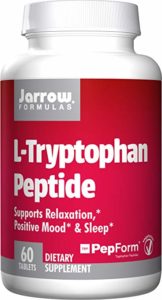
Jarrow Formulas is a pretty reliable manufacturer when it comes to pushing out the boundaries on supplements. Unlike the rest of the competition, Jarrow Formulas has their own partially metabolized form of tryptophan that they claim is more effective than free L-tryptophan.
The blend delivers only 250 mg of tryptophan per capsule, but it’s in the form of a tryptophan peptide. Whether you think this is a more effective way to deliver tryptophan depends on the degree to which you believe in the nutritionists at Jarrow Formulas—there’s no published research demonstrating the superiority of the peptide form of tryptophan.
7. MicroIngredients L-Tryptophan
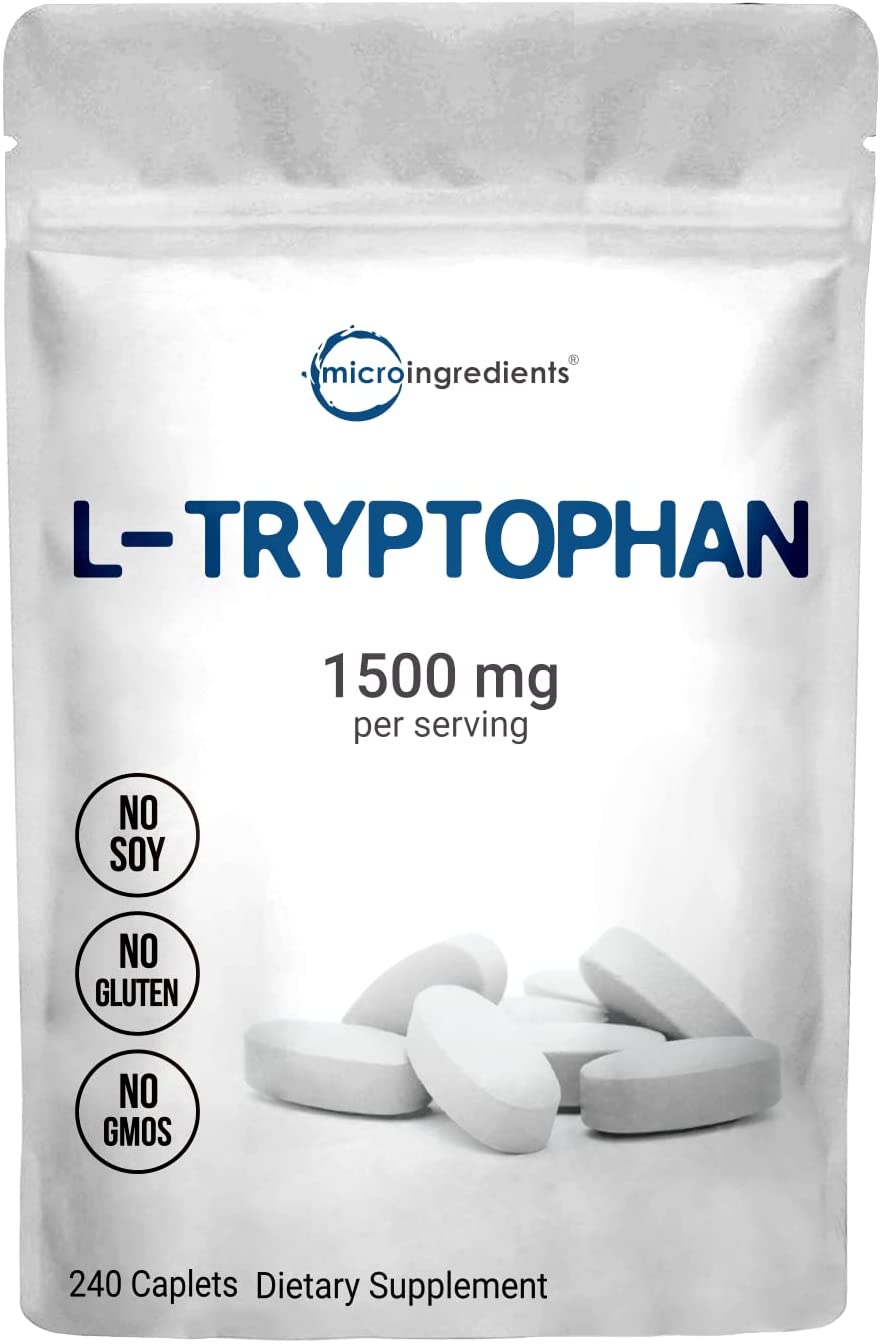
MicroIngredients makes a pretty simple pressed tablet that delivers 500 mg of L-tryptophan. The dosage is solid, but the primary downside is the additives and binders that need to be added to stabilize the pressed tablet. If these downsides don’t bother you, it’s a decent choice.
8. BulkSupplements L-Tryptophan
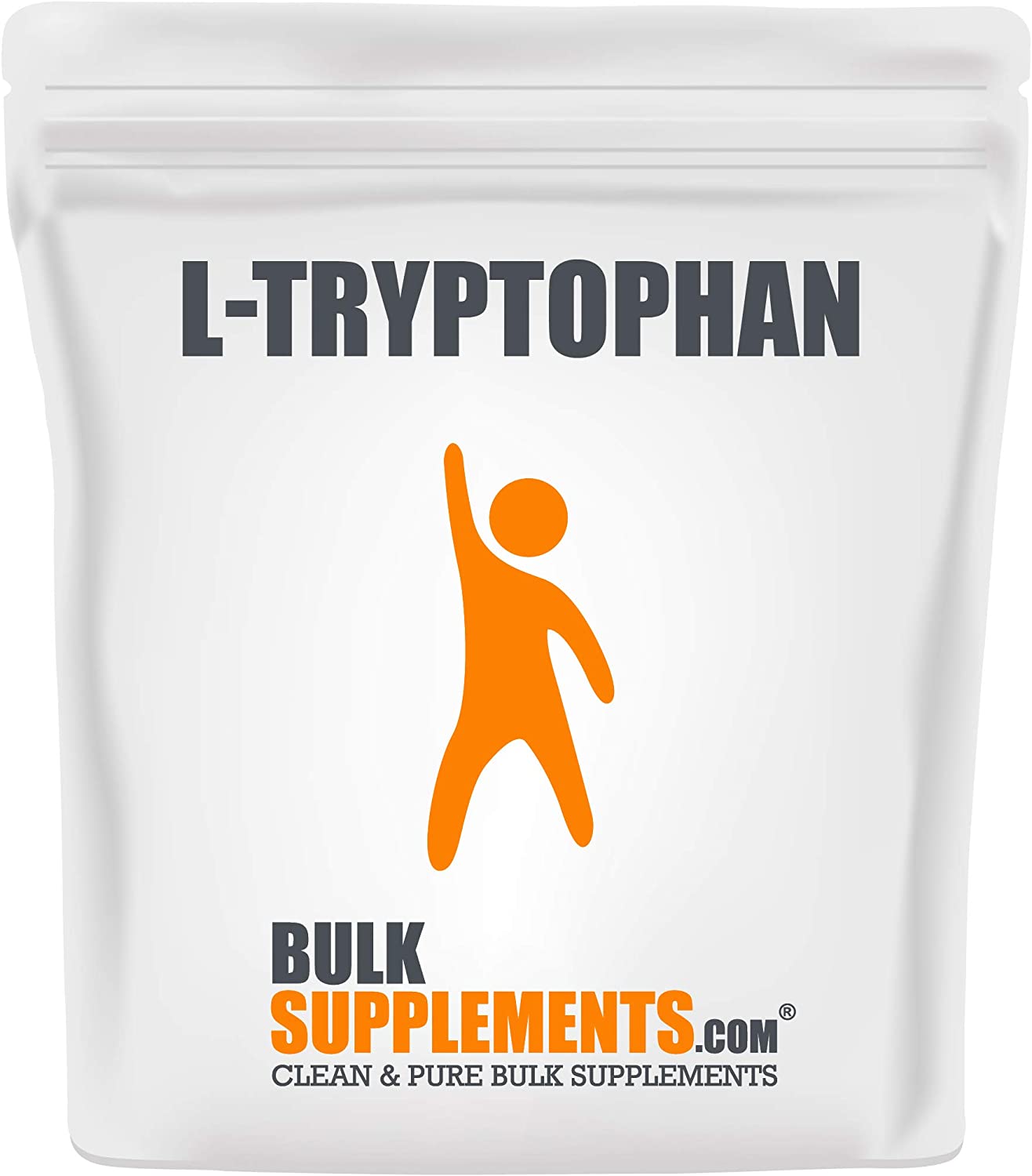
While powder-form tryptophan isn’t for everyone, for those who need it, BulkSupplements is definitely the way to go: it’s pure, simple, and potent. There’s no better option out there for mixing up your own custom nootropic stacks or incorporating tryptophan into your shakes and smoothies.
9. Source Naturals L-Tryptophan
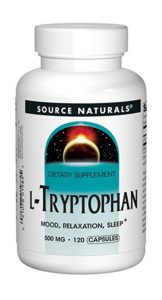
Though this supplement advertises itself as containing 1.5 grams of tryptophan per serving, it’s a bit misleading: it’s really just 500 mg per capsule, with three capsules recommended as a “serving.”
This by itself isn’t a dealbreaker, but it’s disappointing to see a number of extra ingredients, like dibasic calcium phosphate and silica, that probably don’t need to be in the supplement. It’s not necessarily a bad choice, but Source Naturals L-Tryptophan gets outclassed by the competitions on a number of fronts.
10. Doctor’s Best L-Tryptophan Tryptopure
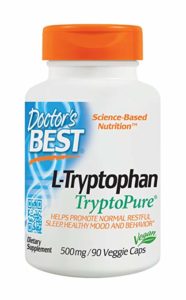
Doctor’s Best has a tryptophan supplement that uses a proprietary tryptophan preparation, called Tryptopure, to deliver its 500 mg dose.
This is fine, but the real issue with this supplement is that it’s bloated with excessive additives that don’t really improve the quality of the supplement.
While it’s still likely to function just fine, given the choice, it’d probably be better to go with something that’s designed a bit more minimal if ingredients are important to you.
Category winners
Best tryptophan overall: Amazing Formulas L-Tryptophan
Amazing Formulas boasts an impressive 1000 mg of tryptophan per capsule, making it an industry leader when it comes to dosage. This high dose formulation makes it great for a wide range of applications, from mood elevation to cognitive function. Its excellent dosage and versatility make it our top pick.
Best tryptophan for cognitive function: Amazing Formulas L-Tryptophan
Whether you’re looking for a tryptophan supplement that gives you a short-term nootropic boost or for sustaining cognitive health over the long-term, our overall winner from Amazing Formulas is a great choice. The high dose makes it especially effective, and the lack of extraneous ingredients means you don’t have to worry about additives, fillers, or secondary active ingredients.
Best powder-form tryptophan: BulkSupplements L-Tryptophan
BulkSupplements is a great company that focuses on pure and high-quality powder-form ingredients, and their tryptophan supplement fits this description perfectly. If you’re mixing up your own nootropic supplement stack, or if you want to incorporate tryptophan into protein shakes or smoothies, BulkSupplements’ powder-form tryptophan is definitely the way to go.
Best tryptophan for boosting mood: Amazing Formulas L-Tryptophan
Tryptophan is an important precursor to serotonin, and for this reason, tryptophan is a popular supplement among people with feelings of depression, anxiety, or other negative mood states. If you’re looking for a tryptophan supplement to boost your mood, Amazing Formulas L-Tryptophan is a great choice thanks to its high dosage and clean supplement design.
Best tryptophan for sleep: NOW L-Tryptophan
NOW L-Tryptophan is a great, well-balanced and well-formulated tryptophan supplement that provides a solid 500 mg dosage that can sustain better relaxation and sleep through the night, without any secondary ingredients.
Best tryptophan for older adults: Nutricost L-Tryptophan
Nutricost L-Tryptophan pairs their 500 mg dosage of tryptophan with 5 mg of BioPerine to boost the bioavailability of the tryptophan once it’s inside your body. This combo works well for older adults since it’s geared more towards sustaining moderately high levels of tryptophan long-term, versus getting a quick boost in tryptophan levels for shorter-term applications like relaxation or boosting mood.
Who should buy tryptophan?
Tryptophan supplements are safe for most individuals and can help improve mental health conditions, memory, and sleep. It can also help increase the feeling of fullness after eating a meal by influencing serotonin.
People taking CNS depressants, MAOI’s and other anti-depressant drugs should extremely cautious about taking tryptophan supplements due to the sever interaction. Pregnant and breastfeeding women should avoid tryptophan since they may harm the fetus. Children should also avoid tryptophan supplements unless otherwise directed by a doctor.
How we ranked
When picking the best tryptophan supplements, we first looked at the ingredients. We preferred pure L-tryptophan products over sleep blends as we wanted to experience the full power of tryptophan. Any supplement that included a proprietary blend was severely penalized and axed from our rankings. In terms of dosages, we rewarded products that contained at least 500mg per serving, like Pure Naturals and Superior Labs.
We did make an exception for Jarrow Formulas, which included just 250mg per serving. This is because they included a tryptophan peptide variation, which allowed for more effectiveness milligram for milligram. However, the lack of published research surrounding the peptide is why they didn’t make the top 5.
Capsule design was also important, with cellulose being our preferred choice. This allowed for vegans and vegetarians to freely take the supplement, which is why Now ranked so well. Products that included a lot of additives and fillers in the capsule were axed from the list.
In terms of bioavailability, we concluded that pure tryptophan products were ideal after extensive research. Nutricost goes the extra mile to include BioPerine, but without supporting research proving its efficacy in improving tryptophan absorption, we found this to be a rather unnecessary additive.
Benefits
Low levels of tryptophan are associated with depression symptoms. Depression can manifest as a decrease in levels of the neurotransmitter serotonin; indeed, the most popular category of antidepressant medication is selective serotonin reuptake inhibitors.
These drugs slow the rate at which serotonin is reabsorbed into the brain. When considering the biochemistry of tryptophan, one naturally wonders whether a “supply-side” approach would work too.
This was exactly the question explored by researchers at McGill University in Canada (1). A team of researchers published a study in the journal Psychopharmacology that involved a period of intentional tryptophan depletion, followed by a battery of cognitive and emotional screenings.
Compared to subjects who had not been acutely depleted of tryptophan, the tryptophan-depleted subjects scored higher on a depression inventory and were more easily distracted by negative thoughts during a proofreading task.
Maintaining high tryptophan may be important for staying healthy after recovery from depression. Later research published in The Lancet found a starkly similar effect when women with a history of depression consumed a mixture of amino acids that did not include tryptophan.
Women who had a history of depression, but were currently healthy, experienced a rapid relapse of symptoms when they were acutely depleted of tryptophan (2).
The downward spiral in emotional status was so rapid and so sudden that it’s hard to come up with any other explanation than that serotonin levels crashed after the body’s tryptophan levels were depleted.
A tryptophan supplement might play a role in maintaining good mental health, instead of just being useful as a treatment for depression.
Tryptophan could be used to directly treat depression. Because of the above evidence, among other indicators, tryptophan has been investigated as a direct treatment for depression.
One clinical trial on tryptophan for treating depression was published in the journal Psychological Medicine (3). The study compared a placebo, a traditional antidepressant, and tryptophan for treating depression in a 12-week study.
The results showed that the tryptophan supplement performed as well as the traditional antidepressant, and both performed better than the placebo.
Tryptophan can improve mood, memory, and sleep. Given the wide-ranging effects of serotonin, it should not be particularly surprising that tryptophan has applications that range beyond just treating depression or preventing its recurrence.
A scientific review article by B.Y. Silber and J.A.J. Schmidt published in the scientific journal Neuroscience & BIibehavioral Reviews in 2010 took a closer look at some of the experimental evidence for tryptophan beyond just treating depression (4).
Tryptophan appears to be a strong mood stabilizer, which should not be shocking given the evidence on depression reviewed earlier. These mood improvements aren’t limited to making depressed people feel normal—tryptophan has been used to lower aggression and decrease impulsive behavior associated with ADHD.
But beyond this, tryptophan supplementation appears to reliably improve memory and even improve sleep quality. Improvements in sleep quality shouldn’t be surprising, because tryptophan is chemically related to the sleep-inducing hormone melatonin. The benefits are not universal, though; tryptophan appears to slightly slow your reaction time, perhaps because it works as a mild sedative (hence the sleep quality enhancements).
This suggests that tryptophan supplementation might work best best for slower-paced cognitive tasks that require strong memory skills, like working with information from many different sources at once.
For nootropic use, it’d be best for studying for an exam (a lower pressure task that isn’t time-dependent), not actually taking an exam (which requires rapid-fire cognitive processing ability).
Side effects
It’s hard to look into tryptophan without running up against one of the biggest stories about devastating side effects in recent memory.
In the late 1980s, an outbreak of a rare and sometimes fatal neurological disease was traced to contaminated samples of tryptophan used in supplements.
The supplements were undeniably linked to the development of the disease, but there still exists controversy over what exactly caused the side effects: researchers disagree whether trace impurities were the sole cause, or if the tryptophan itself played any role (5).
This led to an embargo on tryptophan supplements, which was eventually lifted in 2001, but certain countries are still restricted from importing tryptophan for supplemental use into the United States.
Some researchers, such as D.M. Richard and colleagues at the University of Texas Health Science Center, argue that tryptophan is safe when used at clinical doses, pointing to a large body of clinical literature demonstrating the safety and efficacy of this supplement (6).
Tryptophan should not be used without medical supervision by anyone who is already taking antidepressants, because the combined action of tryptophan and a SSRI or other serotonin-modulating prescription medication can cause serious side effects.
Talk to your doctor first if you already use an antidepressant or other prescription medication that acts on neurotransmitters.
Recommended dose
Though tryptophan has been widely studied, there is no general consensus on the optimal dosage. Studies on its use have successfully employed doses from less than one gram per day all the way up to nine grams per day.
The typical dose, and a good starting place, appears to be right around one gram per day, possibly split into two equal doses. From here, you may need to adjust your dosage up or down depending on how your body responds.
FAQ
What is tryptophan? Tryptophan is an essential metabolic component of the human diet for a range of bodily functions. It is one of ten essential amino acids, meaning the body does not have the ability to synthesize it. Tryptophan must be acquired by outside sources, namely dietary intake.
Foods known to be high in tryptophan include chocolate, yogurt, eggs, cheese, milk, cottage cheese, turkey, chicken, fish, red meat, pumpkin seeds, chickpeas, almonds, and peanuts.
Does tryptophan influence your mood? Tryptophan plays a core role in regulating your body’s mood and cognitive function. It’s the primary precursor to the neurotransmitter serotonin (and the only amino acid that can be transformed into serotonin), so modulations in tryptophan levels affect your body’s ability to synthesize and use serotonin.
Given that healthy serotonin levels are critically important for proper cognitive function, it should be no surprise that tryptophan is so intensely studied for its ability to regulate mood and cognitive function.
What is the role of tryptophan? Tryptophan is used by the body for two crucial functions. First, tryptophan is a precursor to Vitamin B3 or Niacin. The body, particularly the liver, is able to synthesize this necessary B vitamin from tryptophan with the proper intake (7). Niacin is an essential nutrient for the proper function of all bodily systems, including the production of hormones and cellular regeneration.
Secondly, tryptophan is a precursor to the neurotransmitter serotonin, and therefore a fundamental aspect in the regulation of mood, stress responses, and appetite. Clinical trials indicate the potential for tryptophan-based treatment in patients who struggle or suffer from various psychiatric disorders (8).
Which foods contain tryptophan? Tryptophan can be found in most protein-based foods. Some of these include pumpkin seeds, soybeans, cheese, meats such as lamb, chicken, and salmon, oats, beans, and lentils, bananas, prunes, bread, and chocolate.
What is the recommended daily intake of tryptophan? The amount of tryptophan a person should consume per day varies depending relatively on the individual. As dietary guidelines are set forth, the recommended daily amount is 250 mg-425 mg per day or about 4 mg per kilogram of body weight (9).
What are the symptoms of tryptophan deficiency? Symptoms of tryptophan deficiency can begin at just 25% below the necessary intake. Symptoms can include depression, irritability, anxiety, impulsiveness, poor cognitive function, insomnia, overeating, and weight gain.
Are tryptophan supplements safe? The United States placed a ban on the use of tryptophan as a dietary supplement in 1989, and the ban lasted until 2005. The ban was due to an isolated occurrence of death that occurred following the disbursement of one manufacturer’s contaminated product. Since then, the Food and Drug Administration has lifted the ban on tryptophan supplements but still advises that users exercise caution.
A newer supplement called 5-HTP has recently come to the supplement market. The 5-HTP simply stands for 5-hydroxytryptophan, which is what the body makes out of tryptophan before synthesizing serotonin.
Who shouldn’t take 5-HTP, a kind of tryptophan? Essentially, when taking 5-HTP, your body is one step closer to producing serotonin. The recommended dosage of 5-HTP is 50-200 mg three times daily; however, there are some conditions and precautions for taking 5-HTP (10). Anyone with Downs Syndrome or epilepsy should not take 5-HTP, as it has been linked to seizures.
If you are currently taking any medication that affects serotonin levels, you should not take a serotonin-boosting nootropic such as 5-HTP. Those taking medications for Parkinson’s Disease should not supplement with 5-HTP.
If you are administering 5-HTP or any other amino acid precursors to serotonin or dopamine, do so with great care. If an individual only takes a supplement to improve one of the transmitters, other neurotransmitters will likely be depleted in the process. This may only exacerbate the existing conditions that an individual would be supplementing to treat (11).
What are the benefits of a diet rich in tryptophan? Eating a well-balanced diet can often reduce the need for supplementation. Levels of tryptophan in individual foods are sometimes too low to be significant, and therefore a well-rounded diet with various sources of tryptophan is ideal. Balanced meals beginning with a breakfast containing foods rich in tryptophan can be beneficial for those seeking a serotonin boost.
Because tryptophan is necessary for the creation of serotonin, eating foods that contain notable levels of tryptophan can lead to elevated and regulated moods, reduced anxiety, the healing of wounds, improved bone health, increased emotional well-being, and improved pain tolerance.
Is tryptophan the cause of drowsiness after a Thanksgiving meal? Although turkey contains tryptophan, the levels are no higher than those in chicken, tuna, beef, nuts, soybeans, and cheese. Typically, the combination of high amounts of protein mixed with carbohydrates is what causes drowsiness after your Thanksgiving meal.
Can tryptophan be used to treat insomnia? In addition to contributing to the production of serotonin and niacin, tryptophan has an important role in the body’s creation of melatonin, a hormone that helps the body sleep. According to the Centers for Disease Control, 1 in 3 adults does not get enough proper sleep regularly throughout the United States (12).
One clinical trial was done to observe the effects of tryptophan on the sleep hormone melatonin. After various administrations of tryptophan were given during both day and nighttime, a substantial sleep-inducing effect was observed. In addition, the application of tryptophan resulted in a massive elevation of melatonin levels in plasma (13). This indicates that tryptophan may be a viable candidate for easing the effects of insomnia.
When is the best time of day to incorporate more tryptophan for sleep? One study done examined 33 male college students divided into four groups (14). Among the four groups, one was given a low-tryptophan breakfast and low exposure to natural light throughout the day. The second group was given a breakfast rich in tryptophan but had low exposure to natural light throughout the day.
The third group was given a breakfast low in tryptophan but had significantly higher exposure to natural light throughout the day, and the fourth group ate a breakfast high in tryptophan and had significant exposure to natural light during the day. This study lasted four nights and five days.
The results of this study indicated higher levels of melatonin in both saliva and urine for the group, with both a significant amount of exposure to sunlight in addition to a tryptophan-rich breakfast. This indicates that a breakfast high in tryptophan and sufficient exposure to natural light throughout the day can significantly improve melatonin levels at night, leading to a more restful and deep sleep.
Can tryptophan be used to improve mood? Although tryptophan is available for use as a dietary supplement in the United States, as well as licensed as an antidepressant in several other countries, evidence for its use in the treatment of depression is limited and inconclusive. One study done examined 38 healthy women and whether tryptophan-induced a positive cognitive bias opposite to that found in depression (15).
The study lasted for 14 days and involved the randomized administration of tryptophan and placebo. At the conclusion of the study, emotional processing was examined using four methods.
The conclusions of this study indicate the evidence that a tryptophan supplement produces positive emotional bias and processing in women similar to the characteristics of certain serotonin-involved antidepressants. However, this study needs to be performed again to examine the results of men.
Can tryptophan be used for the symptoms of PMS? For women suffering from premenstrual symptoms or premenstrual dysphoria, their monthly cycle can be stressful, debilitating, and unpredictable. Some women seek psychiatric help because of the intensity of their mood swings and emotional upsets during the various phases of hormonal shifts.
Premenstrual dysphoric disorder is characterized by symptoms similar to PMS but on a significantly worse scale. Symptoms can include extreme irritability, sadness, hopelessness, anger, and other mood shifts that can disrupt work and damage relationships.
Tryptophan has been used in a varying number of clinical studies to examine its potential for easing some of the symptoms of these hormonal changes. One study done examined 37 women diagnosed with premenstrual dysphoric disorder over the course of 3 consecutive menstrual cycles (16).
The women were given either 6 grams of tryptophan per day or a randomized placebo. The results of the study concluded that supplementing with tryptophan during the luteal phase of the menstrual cycle resulted in a significant therapeutic effect on symptoms such as dysphoria, mood swings, tension, and irritability.
Can tryptophan be used for panic attacks? A study was done to examine 24 individuals with panic disorder and 24 individuals without panic disorder, using 200 mg of 5-HTP and a placebo (17). The results indicated that the 5-HTP greatly reduced the individual response to panic in individuals with panic disorder, including relative anxiety, symptom scores, and the number of panic attacks.
This indicates that 5-HTP is successful in inhibiting a panic response, and that serotonin plays an important role in those with panic disorder.
Is tryptophan dangerous? Although studies are ongoing and incomplete, the Journal of Nutrition indicates that the side effects of supplemental tryptophan are relatively mild when taken at recommended doses (18). Some individuals report drowsiness as a side effect, although this is subjective, especially for those taking tryptophan to help with sleep. Other side effects include nausea, tremors, and dizziness when taken at higher doses anywhere from 70-200 mg.
It is not recommended that tryptophan be taken as a supplement in conjunction with other serotonin influencing or enhancing drugs. This can result in a range of intensified side effects, including the rare instance of serotonin syndrome. Serotonin syndrome produces severe symptoms such as delirium, hyperthermia, coma, and muscle spasms (19).
Can I take a tryptophan supplement if I am pregnant or nursing? As with many dietary supplements, tryptophan and 5-HTP should not be taken during pregnancy and breastfeeding unless specified by a doctor.
Medical researchers and professionals agree there is not enough information to be certain whether taking a tryptophan supplement during pregnancy is safe. According to the U.S. National Library of Medicine, Tryptophan is listed as likely unsafe for the unborn child and should be avoided during pregnancy (20).
Related articles
Recap
Tryptophan, seemingly a simple amino acid, plays a critical role in regulating your cognitive function and well-being because it is a direct precursor to the neurotransmitter serotonin.
Deficits in tryptophan reliably induce symptoms of depression, and can cause recurrence of depression in people who’ve already recovered from it. It’s been researched as a direct treatment for depression and as a way to decrease feelings of aggression and impulsive behavior.
Tryptophan may even boost your memory. For nootropic use, tryptophan seems to work best in situations where you need extended memory capabilities and a stable, relaxed mindset, but don’t need rapid cognitive processing abilities. For those situations, something like caffeine would be better.
To avoid side effects, you should make sure your tryptophan supplement comes from a high-quality manufacturer, and you should not take it without talking to your doctor if you are already taking a prescription medication that acts on serotonin, like an SSRI for depression.
Though its biological activity is complex, this lowly amino acid holds a lot of promise for helping ensure optimal cognitive function.
For BodyNutrition’s #1 recommended tryptophan supplement, click here.